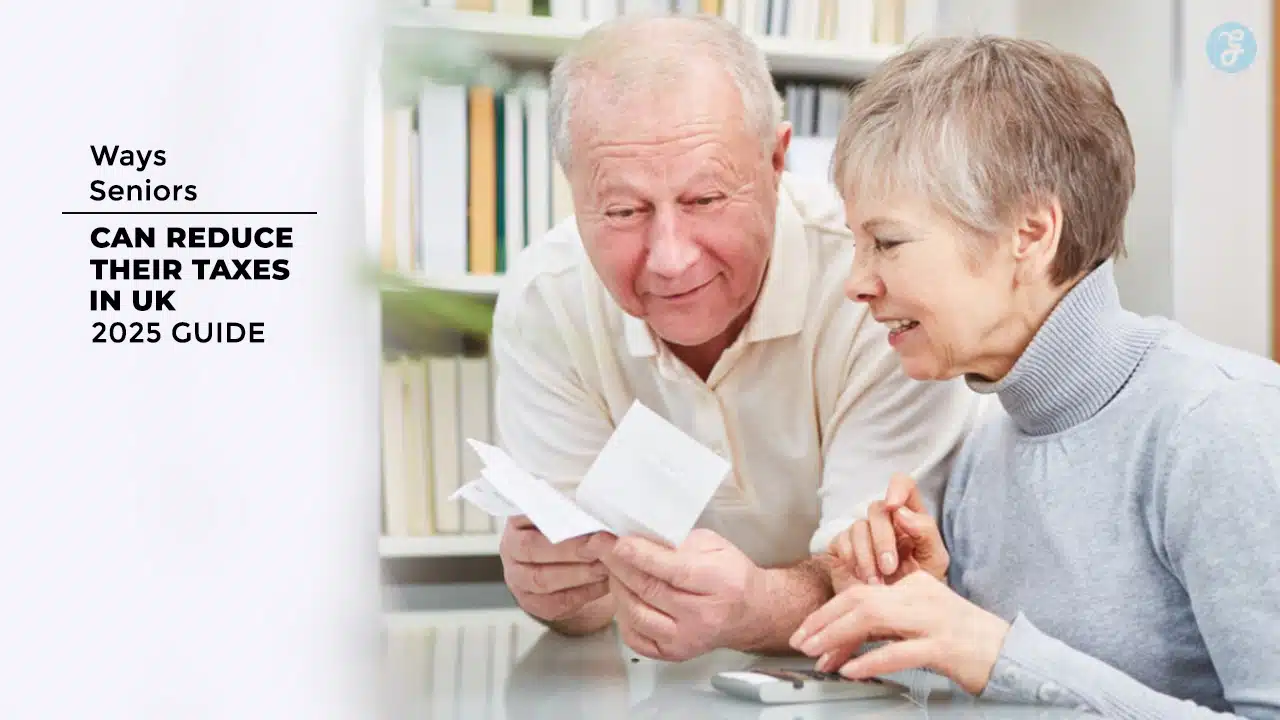Managing taxes can be challenging, especially for seniors living on fixed incomes. However, by taking advantage of available reliefs and implementing smart strategies, seniors can significantly reduce their tax burden.
This guide outlines Tax-Saving Tips for Seniors in the UK, offering practical advice to help retirees save money while staying compliant with tax regulations.
With careful planning and awareness, seniors can navigate the tax landscape effectively and safeguard their financial future.
Understanding Taxation for Seniors in the UK
As a senior, understanding the tax rules specific to your situation is essential. Income tax in the UK is applied to various sources of income, including pensions, savings, and investments. Here are the key allowances and rates for 2025:
| Income Band | Tax Rate |
| Up to £12,570 | 0% (Personal Allowance) |
| £12,571 to £50,270 | 20% (Basic Rate) |
| £50,271 to £125,140 | 40% (Higher Rate) |
| Over £125,141 | 45% (Additional Rate) |
State pensions are taxable but paid gross (without tax deductions). Any other income sources, such as private pensions, rental income, or dividends, may also be subject to tax. Staying within the appropriate tax band through strategic planning can help minimize liabilities.
Common Tax Challenges Faced by Seniors
- Overpayment of Taxes: Lack of awareness about available reliefs often leads to paying more than necessary.
- Insufficient Planning: Failing to fully utilize allowances or exemptions can increase tax liabilities.
- Complex Rules: Navigating inheritance tax, capital gains tax, and other rules without guidance can be overwhelming.
- Inflation Impacts: Rising costs of living may strain budgets, highlighting the importance of maximizing savings.
10 Effective Strategies to Reduce Taxes for Seniors in the UK
1. Maximize Your Personal Allowance
The personal allowance is one of the simplest yet most effective tools to reduce your tax liability. It allows you to earn up to a certain threshold without paying income tax. For most seniors, this threshold is set at £12,570 for the tax year 2025.
Beyond this amount, your income becomes subject to varying tax rates. Understanding how to fully utilize your personal allowance can save you hundreds or even thousands of pounds annually.
Whether it’s through splitting income with a spouse or managing additional sources of income like pensions and investments, proper planning ensures that you stay within the allowable limits and avoid unnecessary taxation.
Action Steps
- Split Income with a Spouse: If your spouse earns less than their personal allowance, consider transferring income or assets to utilize their tax-free threshold.
- Monitor Adjusted Net Income: If your income exceeds £100,000, the personal allowance reduces by £1 for every £2 over the limit, so effective income management is essential.
| Allowance | Amount (2025) |
| Standard Personal Allowance | £12,570 |
| Born Before April 1935 | Varies based on income |
Example: A retiree earning £12,500 annually would not pay income tax, but an income of £13,000 would result in a taxable amount of £430.
2. Claim the Married Couple’s Allowance
The married couple’s allowance is designed to benefit older couples where one partner was born before April 6, 1935. This allowance can significantly reduce your tax bill, offering a maximum relief of up to £1070 annually in 2025. It’s a valuable tax-saving tool that ensures couples can optimize their finances while meeting eligibility requirements.
By combining this allowance with other tax reliefs, such as personal and savings allowances, couples can better manage their taxable income. This allowance is particularly beneficial for retirees who are looking to maximize their savings while adhering to legal tax policies.
Action Steps
- Eligibility Check: Confirm eligibility based on age and marital status.
- Application: Apply through HMRC by submitting form 575.
| Criteria | Details |
| Born Before April 1935 | Eligible for allowance |
| Maximum Relief (2025) | £1070 |
Example: A couple where one spouse earns £20,000 and the other earns £12,000 can save significant tax by claiming this allowance.
3. Leverage Tax-Free Savings Accounts (ISAs)
Individual Savings Accounts (ISAs) are a cornerstone for tax-efficient saving and investing in the UK. These accounts allow retirees to grow their wealth without worrying about paying income tax on interest, dividends, or capital gains.
For 2025, the annual contribution limit is set at £20,000, making it a versatile option for seniors who wish to save or invest tax-free. Cash ISAs provide stable, risk-free returns, while Stocks and Shares ISAs offer higher growth potential for those willing to accept some level of risk.
Utilizing ISAs ensures that seniors can make the most of their retirement savings while maintaining financial flexibility.
Action Steps
- Maximize annual ISA contributions (£20,000 in 2025).
- Utilize Lifetime ISAs if under the age of 50 for retirement savings.
- Diversify between Cash ISAs and Stocks and Shares ISAs to balance risk and reward.
| ISA Type | Annual Limit (2025) |
| Cash ISA | £20,000 |
| Stocks and Shares ISA | £20,000 |
| Lifetime ISA | £4,000 |
Example: A retiree saving the full £20,000 in a Stocks and Shares ISA could see tax-free growth of £2,000 annually based on a 10% return.
4. Reduce Inheritance Tax (IHT) Liabilities
Inheritance tax (IHT) can significantly diminish the value of estates left to loved ones. In 2025, estates valued over £325,000 are subject to a 40% tax rate on the amount above this threshold. However, strategic planning can help seniors mitigate or eliminate IHT liabilities.
Methods such as gifting assets, establishing trusts, or making charitable donations can lower taxable estate values. Additionally, the use of the Residence Nil Rate Band (£175,000 for passing on family homes) offers further relief. By understanding these options, seniors can ensure their wealth is preserved for future generations.
Action Steps
- Gift Assets: Utilize the annual gift allowance of £3,000 without incurring tax.
- Set Up Trusts: Safeguard assets and reduce taxable estate value.
- Charitable Donations: Gifts to charities are fully exempt from IHT.
| Threshold | Rate |
| Nil-Rate Band | £325,000 |
| Above Threshold | 40% |
Example: By gifting £50,000 to a trust, a senior could potentially save £20,000 in IHT on that amount.
5. Use Pension Contributions for Tax Relief
Pension contributions offer significant tax relief by reducing taxable income, making it a valuable tool for seniors still working part-time or managing pension withdrawals. Contributions up to £60,000 annually (or 100% of earnings) qualify for relief, depending on individual circumstances.
This strategy not only minimizes current tax liabilities but also enhances retirement savings. Drawing pension income strategically can further reduce tax exposure, particularly by staying within lower tax brackets. With careful management, pensions can serve as a dual-purpose tool: providing income security and optimizing tax efficiency.
Action Steps
- Contribute up to £60,000 annually or 100% of your earnings, whichever is lower.
- Strategically withdraw income to stay within lower tax brackets.
Example: A senior earning £40,000 could reduce their taxable income to £30,000 by contributing £10,000 to a pension, saving up to £4,000 in taxes.
6. Claim Relief for Medical Expenses
Many seniors face increased healthcare costs as they age, and some of these expenses qualify for tax relief. Medical expenses such as prescription medications, mobility aids, and home modifications for accessibility can often be partially offset through tax deductions or exemptions.
Furthermore, VAT relief may apply to specific medical equipment or services, further reducing the financial burden. Taking advantage of these opportunities not only helps manage healthcare costs but also ensures compliance with tax regulations.
By keeping accurate records and understanding eligible expenses, seniors can make informed claims to minimize their tax liabilities.
Action Steps
- Maintain records of eligible expenses, such as receipts for mobility aids, home adaptations, or private medical care.
- Apply for VAT relief on qualifying goods and services, like stairlifts or specialized chairs.
| Expense Type | Eligibility |
| Mobility Aids | VAT relief available for qualifying goods |
| Home Modifications | Eligible if related to accessibility |
Example: A senior who spends £2,000 on installing a stairlift could save up to £400 by claiming VAT relief and including it in tax deductions.
7. Utilize Rent-a-Room Scheme
The Rent-a-Room Scheme is an excellent opportunity for seniors who have extra space in their homes to earn additional income while reducing their tax liability. Under this scheme, homeowners can earn up to £7,500 annually tax-free by renting out a furnished room in their primary residence.
This tax exemption applies automatically if your rental income does not exceed the threshold, making it a hassle-free way to supplement retirement income. The scheme is particularly beneficial for seniors living alone or with limited financial resources, as it provides a steady income stream without significant tax implications.
Action Steps
- Ensure the rented space is part of your primary residence and is furnished.
- Keep detailed records of rental income and any associated expenses.
- If income exceeds the £7,500 threshold, file a tax return to declare the earnings.
| Criteria | Details |
| Annual Tax-Free Allowance | £7,500 |
| Applies To | Furnished rooms in the home |
Example: A senior renting out a room for £600 per month earns £7,200 annually, which remains entirely tax-free under this scheme.
8. Optimize Capital Gains Tax (CGT) Allowances
Capital Gains Tax (CGT) applies to the profit you make when selling certain assets, such as property or stocks. Seniors can reduce their CGT liability by utilizing the annual exempt amount, which is £6,000 for individuals in 2025.
Married couples can combine their allowances for a total exemption of £12,000. Timing asset sales strategically to stay within the exemption limit or transferring assets to a spouse are effective ways to minimize taxes. Understanding how to optimize CGT allowances ensures that seniors retain more of their investment profits.
Action Steps
- Plan the sale of assets to maximize the use of the annual CGT exemption.
- Transfer assets to a spouse to utilize their allowance and reduce tax liability.
- Keep accurate records of purchase and sale prices for accurate tax calculations.
| Criteria | Details |
| Individual Exemption | £6,000 |
| Married Couple Exemption | £12,000 |
Example: A senior selling stocks with a profit of £5,500 incurs no CGT as the amount is below the annual exemption limit.
9. Invest in Tax-Efficient Financial Products
Tax-efficient financial products, such as Venture Capital Trusts (VCTs) and Enterprise Investment Schemes (EIS), offer attractive tax benefits for seniors looking to invest. These schemes provide income tax relief, exemptions from capital gains tax on profits, and other incentives, making them a powerful tool for reducing overall tax liability.
While these products come with higher risk, they also offer higher returns and significant tax savings, making them suitable for seniors with diverse investment portfolios. Understanding the risks and benefits of these products is crucial for maximizing their potential.
Action Steps
- Research VCTs and EIS options that align with your financial goals.
- Consult with a financial advisor to assess risk tolerance and suitability.
- Monitor investments regularly to ensure they meet expected performance.
| Product Type | Key Benefits |
| Venture Capital Trusts (VCTs) | 30% income tax relief, CGT exemption |
| Enterprise Investment Schemes (EIS) | Income tax relief, inheritance tax exemption |
Example: A senior investing £10,000 in a VCT receives £3,000 in income tax relief while enjoying tax-free capital gains.
10. Seek Professional Tax Advice
Navigating the complexities of the UK tax system can be overwhelming, especially for seniors managing multiple income sources or investments. Seeking professional tax advice ensures that you take full advantage of available reliefs and avoid costly mistakes.
Tax advisors provide personalized strategies tailored to your unique financial situation, helping you optimize savings and comply with tax regulations. Regular consultations with a tax professional can also keep you informed of legislative changes and new opportunities for tax efficiency, offering peace of mind and financial security.
Action Steps
- Research and select a qualified tax advisor with expertise in senior taxation.
- Schedule annual reviews to adjust your tax strategy as needed.
- Keep organized records of income, expenses, and investments to streamline the advisory process.
| Criteria | Details |
| Advisor Expertise | Senior-specific tax strategies |
| Frequency of Consultation | Annual or as-needed basis |
Example: A senior consulting a tax advisor discovers unclaimed allowances, saving £2,000 annually through optimized tax planning.
Additional Tax Reliefs and Benefits for Seniors
Winter Fuel Payment and Cold Weather Payment
Eligible seniors can receive payments to help cover heating costs during winter months.
Council Tax Discounts
Seniors on low incomes or living alone may qualify for council tax reductions or exemptions.
Takeaway
Proactive tax planning can significantly improve financial stability for retirees. By implementing these Tax-Saving Tips for Seniors in the UK, you can minimize liabilities and maximize savings.
Whether it’s leveraging personal allowances, reducing inheritance tax, or seeking professional advice, these strategies provide a clear roadmap to financial peace of mind. For more insights on managing your finances, visit Editorialge.







































